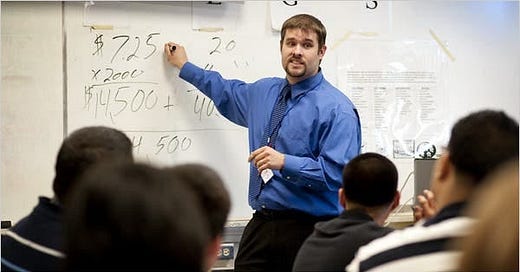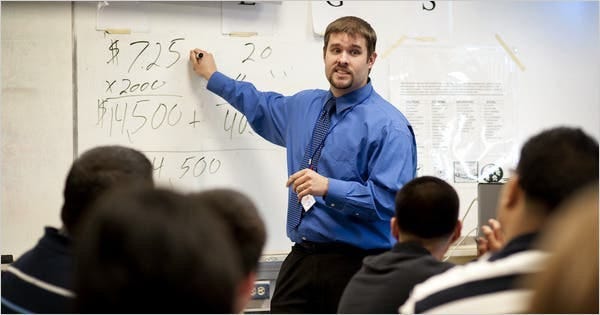Personal Finance in High School, I vote No.
Personal finance being a required course in high school. This all over the news and social media. While a noble idea, it’s a dangerous one. As a headline it sounds cute. However its dangers start with a culture addicted to using debt and relying on it. This ultimately translates into our kids going into debt because a person of authority in school educated them on it. When the debt portion comes up in the course, a 17 year old will forget everything he learned after hearing things like, “other people’s money…” or “use the card today and pay the bill in 30 days.”
With no concept of money being exchanged for a good or service, there is zero awareness of what is happening. A 17 year old Dan only hears buy now, satisfaction now and worry about it later. How does this teach responsibility? Accountability? It doesn’t. Wind in the sails, spending will become frequent, reckless and lead the kid into debt. Inevitably. Convincing kids to pay anything more than the minimum payment on a credit card is impossible, especially when most adults don’t. When credit card companies expect you to only pay the minimum and as a matter of fact they prefer it. In bold print, at the top of the credit card statement pay the minimum. Why is that? We know why.
So a high school kid can buy $300 sneakers and pay $30 per month until the balance is paid off. With no concept of how interest works or how it’s compounded and not caring to recall the lesson on this from the high school course. Trips to McDonald’s with friends or buying the girlfriend a necklace after being “together” for three months. Parents, be careful what you ask for. While kids learn personal finance they return home to live their financial reality. Parents doing only what they can or know how to do. Leading to confusion and a wasted attempt on a highschool course on the subject. Not all families are created equally and each have their own financial obstacles. Often times being passed down to their kids as “trauma” they carry.
This is just the latest level of “woke” at work. Let us consider the influence of outsiders. First, dealing with a board of education that is often clueless and keeps curriculums sanitized or aligned with what they think. Focusing to provide an educational experience based on trivia and memorizing meaningless stats and facts. Next, dealing with “sponsorships” from local banks, credit unions and credit card companies. The funding has to come from somewhere as most schools are strapped for cash to begin with. Think this is too far fetched? Well, credit card companies have already found their way on to college campuses preying on our kids to sign up for a card and they’ll get a free pizza or T-shirt. A win-win proposition for both sides. What do you think happens once the kid is approved?
Kids make emotional decisions all the time. Only to consider today and what feels good. At 17 it’s not often that a kid is disciplined and structured enough. And if they are, that lesson came and started at home. And this is where the lesson and education on personal finance belongs. In the home, with parents or guardians. Dealing with the day to day life of kids, their reality and a language that they get. We cannot pass the buck off to teachers and then blame them for financial mistakes that kids make. It’s a conflict of interest to have teachers educate kids on money. First, teachers are notoriously underpaid and disgruntled about it. I would be too. Secondly, teachers typically carry student loans. What do you think their messaging will be? Get a student loan if you want to go to school and if you can’t afford something use a credit card.
Parents trusted educators, school systems and colleges. Look what happened with the student loan mess. The role of financial literacy belongs to the parents. Sorry, I know you all have enough to do. You’re tired, stretched thin and have a lot to deal with. But as a dad, it’s my job to prepare my daughter for real life and I refuse to let someone else teach her about money, sexuality, religion, and how to operate her life.
Sex education courses did not curve down teenage pregnancies. Kids still tried drugs. We can’t expect a personal finance course to be that beneficial. I remember the images I was shown on genital warts or the lungs of a smoker. I still had unprotected sex and smoked weed.
The best way to teach our kids about money is at home, hands on and by example. Include them in the budget, ask them questions on what they would do and teach them options. Of Course this needs to be all age appropriate. I am not telling my daughter about investments, she’s three years old. But she knows what a $1 is and where it comes from, work. This is a great place to start with parents. Show your kids where money comes from, how to make money and what work ethic is. Afterall, what good is a degree carried with a loan and the kid has no work ethic?
Parents with self education, exposure and wins, big or small, you can teach your children better than some high school curriculum that will most likely be filled with self interests. Involving them every step of the way. Showing them through action what it means to handle money, responsibly. For a kid to learn all of this in school it will die at home if parents don’t do their part to follow up on the teaching. Just like homework. You ensure that your kid does her homework and you may even inspect to ensure that its true. Well the same rule applies to all areas of learning. The follow up is just as important as the lesson itself.
So if it came to a vote, I vote no on this resolution. For the reasons outlined above and more.
Dan Roman is a Husband, Father, and writer that releases a daily blog. A quick read on money, marriage, parenting, self-improvement, development and his thoughts. Dan is also Founder/Creator of Roman Solutions, a Personal Finance Firm that currently provides coaching and education.
To connect with Dan visit: https://linktr.ee/bydanroman
Or by email : financialdifference@danromansolutions.com




